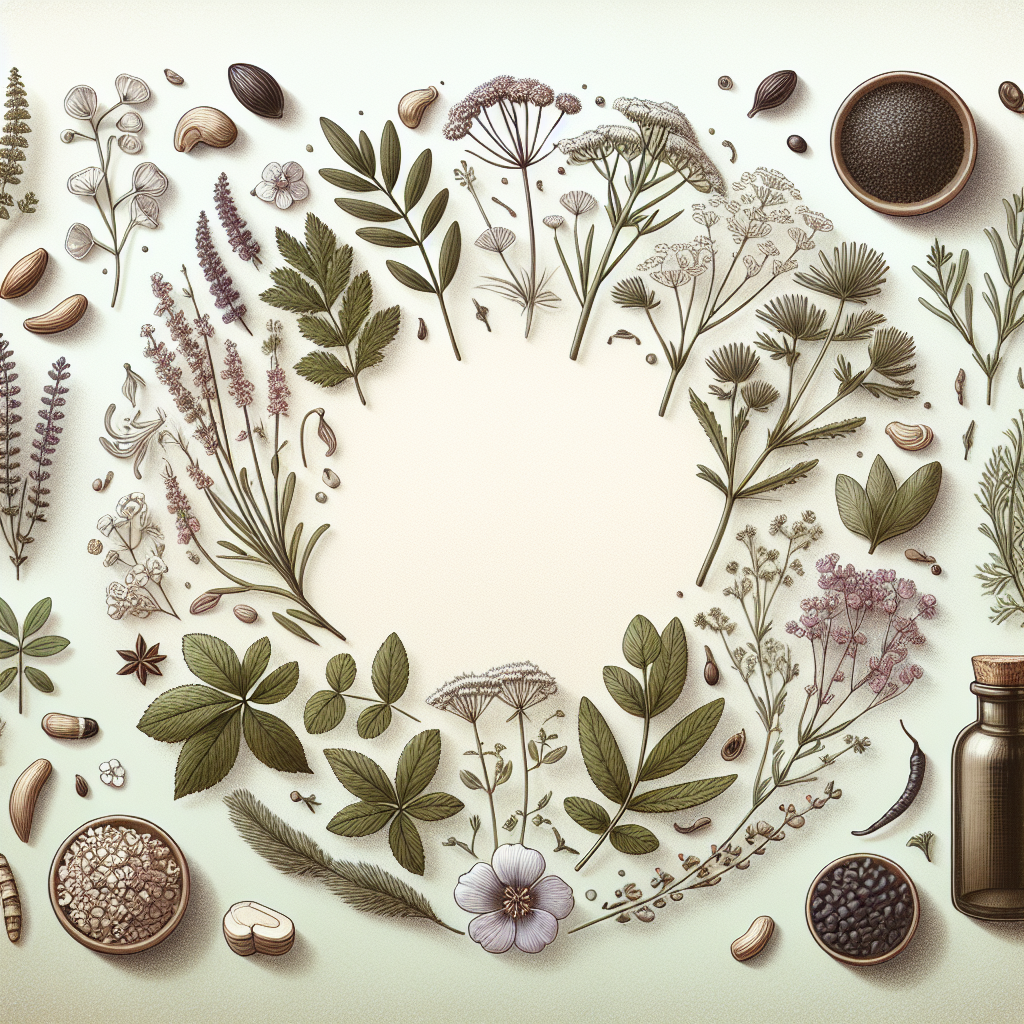The Most Effective Herbal Remedies for Vaginal Dryness
Vaginal dryness is a common issue faced by many women, often impacting daily comfort and intimate relationships. While there are various pharmaceutical solutions available, many women seek natural and holistic approaches to manage this condition. In this article, we explore the most effective herbal remedies for vaginal dryness, focusing on herbs that promote feminine health and enhance vaginal lubrication.
Understanding Vaginal Dryness: Causes and Symptoms
Vaginal dryness is a common yet often overlooked issue that many women experience at various stages of their lives. It’s more than just a minor inconvenience; it can significantly impact one’s quality of life and intimate relationships. Let’s delve into what causes this condition and how to recognize its symptoms.
Common Causes of Vaginal Dryness
- Hormonal Changes: The most prevalent cause of vaginal dryness is hormonal changes, especially the decrease in estrogen levels during menopause. However, postpartum hormonal shifts and breastfeeding can also lead to this condition. According to the North American Menopause Society, approximately 50% of postmenopausal women experience vaginal dryness due to lower estrogen levels.
- Certain Medications: Some medications, such as antihistamines and antidepressants, have side effects that may contribute to vaginal dryness by reducing natural moisture levels.
- Autoimmune Disorders: Conditions like Sjögren’s syndrome can lead to decreased lubrication throughout the body, including vaginal areas.
- Lifestyle Factors: Smoking and excessive alcohol consumption are known to interfere with circulation and hormone balance, potentially leading to dryness.
- Irritants: Harsh soaps, douches, and certain types of lubricants can disrupt the natural pH balance of the vagina, causing irritation and dryness. For those looking for suitable options, consider reviewing our guide on buying lubricants that maintain vaginal health.
Recognizing the Symptoms
The symptoms of vaginal dryness go beyond a mere lack of moisture. They include:
- Itchiness or Irritation: A persistent itch or raw feeling in or around the vagina can be an early sign.
- Pain During Intercourse: Known medically as dyspareunia, this discomfort is often one of the first noticeable symptoms that prompt women to seek treatment.
- Frequent Urination: Some women experience an increased need to urinate as a result of urethral irritation caused by dryness.
- Bacterial Infections: A dry environment might alter your vaginal flora, making you more susceptible to infections like bacterial vaginosis or UTIs. For those tired of recurrent urinary tract infections, resources are available to explore potential solutions for managing these issues effectively.
The key takeaway here is that if you’re experiencing any degree of discomfort related to vaginal dryness, it’s important not only to recognize these symptoms but also consider exploring a range of treatment options — from traditional medicine approaches to exploring herbs for vaginal dryness — tailored for individual needs.
Herbs for Vaginal Dryness: An Overview
Vaginal dryness can be a pesky problem, affecting approximately 17% of women aged 18-50 and up to 55% of postmenopausal women. Instead of reaching for synthetic solutions, many women are turning to the plant kingdom for relief. Here’s a down-to-earth overview of some of the most effective herbs for vaginal dryness.
The Power of Phytoestrogens
- Red Clover: Known for its high isoflavone content, red clover may help mimic estrogen in the body, potentially alleviating vaginal dryness during menopause. A study published in Maturitas highlighted its positive effects on reducing menopausal symptoms.
- Black Cohosh: Often used in traditional medicine, this herb has shown promise in reducing menopausal symptoms such as hot flashes and vaginal dryness. However, always chat with your healthcare provider before incorporating it into your routine to ensure it’s safe for you.
Soothing and Moisturizing Botanicals
- Aloe Vera Gel: Renowned for its soothing qualities, aloe vera gel can provide moisture and relief from irritation. This natural remedy is often recommended by healthcare professionals as an initial approach due to its gentle nature.
- Evening Primrose Oil: Packed with gamma-linolenic acid (GLA), this oil may support hormonal balance and reduce symptoms associated with vaginal dryness. According to the University of Maryland Medical Center, evening primrose oil can be beneficial when applied topically or taken as a supplement.
The All-Rounders: Versatile Herbal Allies
- Dong Quai: Often dubbed “female ginseng,” Dong Quai has been traditionally used in Chinese medicine to support women’s reproductive health. Its phytoestrogenic properties make it a viable option for balancing hormones naturally.
- Flaxseeds: Not just great in your morning smoothie, flaxseeds are rich in lignans, which may help support hormonal balance and improve overall feminine health.
If you’re considering herbal remedies as an alternative solution to manage vaginal dryness, it’s paramount to consult with a healthcare professional before changing your regimen. Curious about other natural approaches? Check out our detailed guide on natural remedies.
Please remember that while these botanicals can offer relief, they should complement conventional treatments if necessary—not replace them entirely. After all, there’s no harm in having nature’s wisdom work alongside modern medicine!
Top Herbs for Combatting Vaginal Dryness
When it comes to soothing the symptoms of vaginal dryness, nature has been a reliable ally long before modern science stepped in. Here are some top herbs that offer a natural remedy for this common concern:
1. Aloe Vera
- Aloe vera gel is famed for its remarkable soothing properties and can be an effective solution for increasing vaginal moisture. It’s rich in vitamins A, C, and E which contribute to improved skin health and hydration.
- Usage Tip: Pure aloe vera gel can be applied directly to the vaginal area to relieve dryness, offering a natural alternative to commercial lubricants.
2. Calendula
- This brightly colored flower isn’t just pretty; it’s packed with anti-inflammatory properties that may help alleviate dryness. Calendula has been traditionally used in herbal medicine to promote healing and maintain skin elasticity.
- Interesting Fact: Studies have shown calendula may also reduce irritation from radiation therapy, highlighting its potent healing abilities (source: National Library of Medicine).
3. Chamomile
- A staple in calming teas, chamomile is also beneficial for vaginal health due to its anti-inflammatory and calming properties.
- Brew It Up: Enjoy chamomile tea or use it as a gentle wash for the intimate area to experience its soothing effects.
4. Flaxseeds
- Packed with omega-3 fatty acids and lignans, flaxseeds are known for their hormone-balancing effects which can aid in reducing symptoms of menopause including vaginal dryness.
- Nutritional Boost: Add ground flaxseeds to your diet by sprinkling them on yogurt or incorporating them into smoothies.
5. Evening Primrose Oil
- This oil is commonly used as a supplement due to its high gamma-linolenic acid (GLA) content which supports hormonal balance and overall women’s health.
- Dose Wisely: While evening primrose oil is available as supplements, always consult a healthcare provider before starting any new regimen.
While these herbs offer promising benefits, remember that herbal remedies can vary in effectiveness from person to person. If you’re considering exploring more herbs for vaginal dryness, or looking into other natural remedies, consulting with a healthcare professional is always recommended. Book an appointment with Dr. Rena Malik today!
If you’re interested in learning more about maintaining women’s wellness through natural means, dive into our comprehensive guide on various holistic approaches!
The Science Behind Herbal Supplements for Feminine Health
The quest for natural remedies for vaginal dryness has led many women to explore the fascinating world of herbal supplements. But what’s the science behind these flora-based fixes? Let’s dig into the botanical bounty that Mother Nature offers for feminine health.
Understanding Phytoestrogens
At the heart of many herbal treatments lies phytoestrogens—plant-derived compounds that mimic estrogen in the body. These naturally occurring estrogens are thought to play a significant role in enhancing vaginal moisture. For instance, red clover, known for its high phytoestrogen content, is often touted as one of the best herbs for vaginal dryness. According to a study published in Maturitas, red clover may offer relief from menopausal symptoms, including vaginal dryness (source).
Herbs Rich in Essential Fatty Acids
Nourishing your body with essential fatty acids can help improve skin integrity and maintain moisture levels. Evening primrose oil, rich in gamma-linolenic acid (GLA), is a popular choice among herbal supplements aimed at improving feminine health. A clinical study highlighted its potential benefits for alleviating menopausal symptoms (source). Additionally, flaxseeds, high in omega-3 fatty acids, are another fantastic option that support hormonal balance and overall women’s wellness.
The Role of Antioxidants and Anti-Inflammatory Properties
Many herbs also boast potent antioxidant and anti-inflammatory properties, which can contribute to better vaginal health. For example, chamomile tea is renowned not only for its calming effect but also for its anti-inflammatory benefits, which can soothe feminine discomfort during menopause (source). Similarly, calendula, often used topically as an oil or cream, has been praised for its healing properties and ability to enhance skin hydration.
A Holistic Approach to Feminine Health
- Aloe Vera Gel: Known for its hydrating properties and used historically as a traditional medicine for vaginal lubrication.
- Dong Quai: Often referred to as “female ginseng,” this herb is celebrated in Asian medicine for supporting women’s reproductive health.
- Black Cohosh Root: Frequently recommended by practitioners of alternative medicine as a botanical solution for vaginal health during menopause.
Navigating through various herbal remedies might feel like walking through an enchanted forest of possibilities—each leaf promising relief from intimate discomforts. At the end of this leafy lane lies enhanced wellness, where ancient traditions meet modern science. To tailor these solutions specifically to your needs, consider speaking with a healthcare professional during a virtual visit at our clinic (learn more about our virtual visits here). After all, finding the right herb might just be like finding that perfect wand at Ollivanders: it’s all about what works best with your individual magic!
Nutritional Support with Plant-Based Solutions
When it comes to addressing vaginal dryness naturally, incorporating certain herbs and plant-based solutions into your diet can be a game changer. These organic herbs not only promote vaginal moisture but also support overall feminine health. Let’s delve into some of the most effective options.
Phytoestrogens: Nature’s Answer to Estrogen Deficiency
Phytoestrogens are plant-derived compounds that mimic the function of estrogen in the body. These natural estrogen boosters can help alleviate symptoms associated with estrogen deficiency, including vaginal dryness.
- Flaxseeds: Rich in lignans, flaxseeds have been shown to improve hormonal balance in women. Just adding a sprinkle to your morning smoothie or oatmeal can make a significant difference.
- Red Clover: Known for its high isoflavone content, red clover is often recommended for menopause relief. Studies suggest it may enhance vaginal lubrication and reduce dryness.[1]
Energizing Herbs for Hormonal Harmony
Apart from phytoestrogens, certain herbs are renowned for their ability to support female vitality by balancing hormones naturally.
- Dong Quai: Often referred to as “female ginseng,” dong quai has been used in traditional Chinese medicine to support women’s reproductive health.[2]
- Black Cohosh Root: A popular choice for menopause relief, black cohosh has been studied for its capacity to alleviate hot flashes and improve overall hormonal balance.[3]
Soothe with Natural Oils and Supplements
No discussion about plant-based solutions would be complete without mentioning natural oils that can be integral in maintaining optimal intimate moisture levels.
- Aloe Vera Gel: Renowned for its soothing properties, aloe vera gel is an excellent topical application for enhancing vaginal moisture without irritation.[4]
- Evening Primrose Oil: This oil is rich in gamma-linolenic acid (GLA), which may help maintain hormonal equilibrium and reduce dryness.[5]
If you’re experiencing persistent symptoms despite these natural remedies, consider booking a virtual visit with Dr. Rena Malik. As an expert in urology and sexual medicine, she offers tailored advice specific to individual needs.
If nature could talk (thankfully it can’t because who needs their plants talking back?), it would probably ask why you haven’t hopped on these plant-based remedies yet!
The journey towards holistic feminine health starts with small steps—sometimes as simple as adding a few seeds or herbs into your daily routine. Take charge of your health today!
Homeopathic Remedies: A Holistic Approach
In the quest for natural remedies for vaginal dryness, homeopathy offers a gentle and holistic approach towards feminine health. Unlike conventional treatments that often focus solely on alleviating symptoms, homeopathic remedies aim to address the root cause of discomfort by enhancing the body’s natural healing processes.
The Essence of Homeopathy
Homeopathy operates on the principle of “like cures like,” using highly diluted substances to trigger your body’s healing mechanisms. It’s a centuries-old practice that considers your physical, emotional, and psychological well-being as interconnected aspects of health—a perspective that resonates with many seeking alternative medicine for intimate care.
- Pulsatilla: Often recommended for women experiencing changes due to hormonal fluctuations, Pulsatilla can be particularly beneficial in addressing mood swings and dryness.
- Sepia: Known for its efficacy in treating hormonal imbalance symptoms, Sepia is often suggested for women dealing with menopause-related dryness.
- Lachesis: Popular among those navigating menopause transitions, Lachesis helps manage hot flashes and emotional rollercoasters while promoting vaginal lubrication.
Why Consider Homeopathy?
The primary allure of homeopathic remedies lies in their minimal side effects and personalized treatment plans tailored to each individual’s unique constitution. According to a study published in the Journal of Alternative and Complementary Medicine, up to 70% of women who used homeopathic treatments reported significant improvements in their menopausal symptoms.[1]
If you’re intrigued by this holistic approach and wish to explore these plant-based solutions for vaginal dryness further, consider discussing them during a consultation with a qualified practitioner. Remember, it’s crucial to find what works best for your body while ensuring safety and efficacy. For more insights on natural health approaches from a certified urologist’s perspective, check out our detailed guide on natural remedies.
So whether you’re sipping chamomile tea or exploring the soothing powers of aloe vera gel, embracing herbal supplements for feminine health can certainly add an interesting twist to your wellness journey—no incantations required!
How to Safely Use Herbal Treatments
When it comes to finding natural remedies for vaginal dryness, many turn to herbal solutions. While these plant-based options can offer relief, it’s essential to use them correctly and safely to ensure the best results without compromising your health. Let’s dive into some key tips for using herbs for vaginal dryness effectively.
Consult Before You Concoct
Before you head into the world of herbal treatments, consult a healthcare professional. Whether it’s a board-certified urologist or a naturopathic doctor, getting professional advice is crucial. Herbal supplements can interact with medications you might already be taking, so it’s important to avoid any unwanted side effects or complications. Consider scheduling a virtual visit with an expert if you’re unsure where to start.
Patch Test – Your Skin’s Best Friend!
- Aloe Vera Gel: Known for its soothing properties, aloe vera gel is often used as a natural moisturizer. However, do a patch test on your arm before applying it elsewhere.
- Coconut Oil: A popular choice for its moisturizing benefits, but not everyone’s skin loves it. Apply coconut oil on a small skin area first to check for irritation.
Your skin—and other parts—will thank you for this minor precautionary step!
Start Small and Monitor
When introducing new herbal treatments into your regime, start with small amounts. Whether you’re using evening primrose oil or black cohosh root supplements, monitor how your body responds before increasing the dosage. Remember: patience is key when working with holistic approaches like phytoestrogens and vaginal health.
Sourcing Matters
The quality of herbs can vary significantly based on their source. Opt for organic herbs for intimate dryness from reputable suppliers known for high-quality standards. Avoid those that don’t provide transparency about their ingredients or sourcing—you wouldn’t want any mystery guests in this herbal party!
“Herbal products have increasingly become popular alternatives for managing symptoms of menopause and related conditions due to their potential efficacy and safety profile.” — National Institutes of Health
Avoid Overdependence
While these soothing herbs for feminine discomfort can be beneficial, they should not replace conventional medical advice or treatment plans prescribed by your healthcare provider. Using them as complementary options rather than standalone solutions is usually more effective.
If you’re curious about blending traditional medicine with modern practices safely, check out our comprehensive guide on integrating natural remedies in daily health routines: [A Urologist’s Guide to Natural Remedies].
The journey towards using herbal relief effectively should be taken one step at a time—preferably under the guidance of experts who understand both sides of the coin: clinical efficacy and traditional wisdom.
Conclusion: Embracing Natural Remedies for Women’s Wellness
Incorporating herbal remedies into your wellness routine can be a fantastic way to promote vaginal health naturally. The journey towards addressing vaginal dryness doesn’t have to be daunting or clinical—it can be as soothing as a cup of chamomile tea, offering both comfort and relief. The best herbs for vaginal dryness not only help manage symptoms but also contribute to overall feminine well-being.
Why Choose Herbs?
- Natural and Gentle: With minimal side effects, herbs like calendula and aloe vera offer gentle solutions.
- Cultural Wisdom: Traditional medicine has trusted plants like red clover and wild yam for centuries in supporting women’s hormonal balance.
- Versatility: From oils to teas, these botanical solutions for vaginal health offer multiple ways to integrate into your lifestyle.
Diverse Options:
– **Evening Primrose Oil:** Known for easing menopause symptoms.
– **Flaxseeds:** Excellent source of phytoestrogens, promoting hormonal balance.
– **Licorice Root:** May aid in balancing hormones naturally, enhancing intimate care.
– **Ginseng:** Boosts vitality and energy levels in women.
According to a study published in the *Journal of Women’s Health*, phytoestrogens found in many plant-based solutions can significantly improve symptoms related to menopause, including vaginal dryness. This aligns with traditional practices that have long used herbs as natural estrogen boosters for women.
As you explore these remedies, remember that what works wonders for one might not be the panacea for all. It’s always wise to consult with a healthcare professional before beginning any new herbal treatment. For personalized advice and consultations, consider scheduling a virtual visit with Dr. Rena Malik, who can offer tailored guidance based on individual needs.
By embracing these natural remedies for vaginal dryness, you’re not just addressing discomfort—you’re embarking on a holistic approach to feminine health that celebrates the synergy between body and nature. So sip that chamomile tea with pride; your wellness is worth every leaf!



